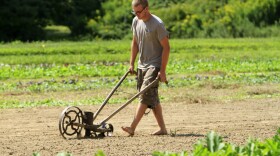Dan Charles
Dan Charles is an independent writer and radio producer who contributes regularly to NPR's technology coverage. He is currently filling in temporarily as an editor on the National Desk, responsible for coverage of the environment and the western United States. He is author of Master Mind: The Rise and Fall of Fritz Haber, the Nobel Laureate Who Launched the Age of Chemical Warfare (Ecco, 2005). He also wrote Lords of the Harvest: Biotech, Big Money, and the Future of Food (Perseus, 2001), about the making of genetically engineered crops. From 1993 to 1999, Charles was a technology correspondent for NPR. Charles covers a wide swath of advanced technology, including telecommunications, energy, agriculture, computers, and biotechnology. He's reported for NPR from India, Russia, Mexico, and various parts of Western Europe. Before joining NPR, Charles was a U.S. correspondent for New Scientist, a major British science magazine.
He studied economics and international affairs at American University, graduating magna cum laude in 1982. In 1982-83, he studied in Bonn, West Germany, under a scholarship from the German Academic Exchange Service. He was a guest researcher at the Institute for Peace Research and Security Policy at the University of Hamburg, Germany, in 1986. In 1989-90, he was a Knight Science Journalism fellow at the Massachusetts Institute of Technology.
-
The grass pea is one: a hardy crop that can thrive in a drought. An agriculturist is spearheading an effort to diversify what farmers grow as climate change threatens staples like corn and wheat.
-
The act of providing food aid to countries in need turns out to be a complicated and controversial matter. Here's why.
-
Tons of green energy projects, both wind and solar, want to connect to the grid. But they're running into a surprising obstacle.
-
Reformist farmers in California have deposed the leader of the country's biggest irrigation district, who was known for fighting water regulations. Farmers are accepting less water means less farming.
-
A promising, less labor-intensive perennial rice is beginning to take off in China, but whether this success can be replicated in other crops like wheat or corn remains to be seen.
-
The honey on supermarket shelves is probably real honey, after all. But claims that illicit Chinese honey was being sneaked into the U.S. market reveal how quick we are to assume the worst about supermarket foods — and imports. Closer analysis reveals a more complex tale.
-
Growing vegetables has never, in recent memory, been quite so cool, or so attractive to the young and well-educated. But many aspiring farmers lack hard, cold cash for land and farm equipment, a survey found.
-
American consumers like their honey bright and clear, but removing the pollen makes it hard to trace honey back to its source. A new report says three quarters of honey sold in the U.S. doesn't contain any pollen.
-
An economist's career was shaped by the food shortages of the 1970s. The rice crisis of 2008, and continuing high food prices around the world, brought him out of semi-retirement. Today, he's busier than ever.
-
No one can guarantee that the rice crisis of 2008 won't happen again. A lot of damage remains from the disaster that sent rice prices soaring even while there was plenty of rice. And there's still some of the fear that produced the crisis in the first place.








